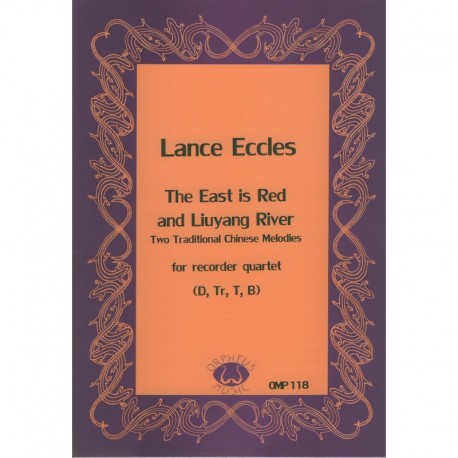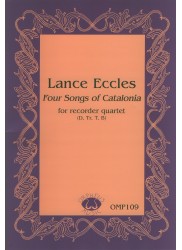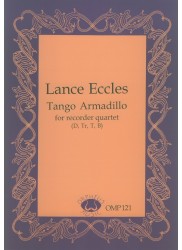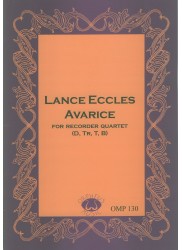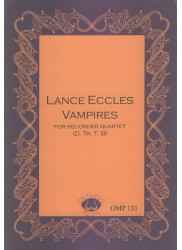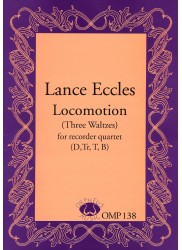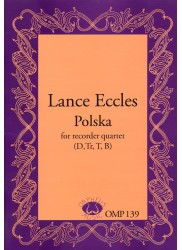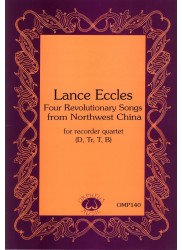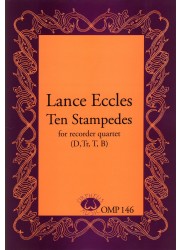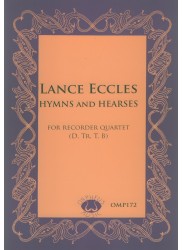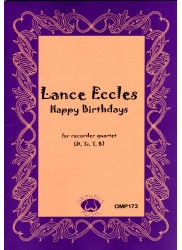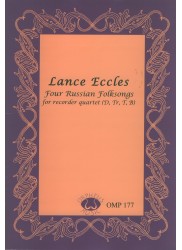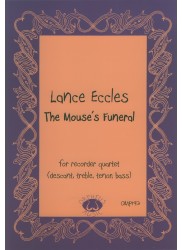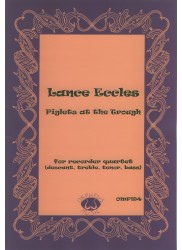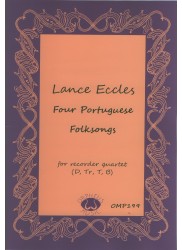No products
Prices are tax included
The East is Red and Liuyang River
Composer: Eccles - Lance
Instrumentation: Descant - Treble - Tenor - Bass
Period/genre: Folk/Trad
Grade: Difficult
More info
*Two Traditional Chinese Melodies* in attractive arrangements.
1. The East is Red
2. Liuyang River
_Score 5 pp. Parts 2 pp._
OMP118 Lance Eccles, The East is Red and Liuyang River (Two Traditional Chinese Melodies)
OMP095 Lance Eccles, Four Korean Folksongs
OMP140 Lance Eccles, Four Revolutionary Songs from Northwest China
These collections were arranged by Lance Eccles, an Australian university lecturer in Chinese who also plays the recorder. The two Chinese collections (The East is Red and Liuyang River and Four Revolutionary Songs from Northwest China) comprise songs widely sung during the Cultural Revolution.
"The East is Red" was the most popular patriotic song during that time, with "Three Rules of Discipline and Eight Points for Attention" in the Four Revolutionary Songs a close second. Although these two songs, plus "Army and People Together" sound martial, others - such as "Red Bloom the Mountain Lilies" and "Embroidering Words of Gold" - are much more lyrical and flowing.
To create his arrangements, Eccles has taken these pentatonic Chinese tunes and arranged them with Western harmonies, a practice common in China itself starting in the 20th century.
Because the songs are short, he has used several devices to create longer pieces. Examples of these devices are: putting the melody in a different part, creating more complex harmony parts on repeats of the melody, introducing more rhythmic complexity, changing the texture by dropping a part for one repeat of the tune, creating canons, and temporarily changing the mode. With these techniques, he successfully maintains interest through multiple variations.
He uses the same techniques to arrange the tines in Four Korean Folksongs, which includes "Arirang", the most famous of all Korean folk songs.
The Kalamazoo Recorder Players found the arrangements in all three collections interesting, tuneful and worth playing. Although the publisher designated these arrangements as "moderate" in difficulty, there are rhythmic and high-range issues with some of the pieces. Eccles' website lists the Four Korean Folksongs as being for the more advanced intermediate consort, which seems an apt description for the other two collections as well.
Judy Whaley and the Kalamazoo Recorder Players, American Recorder, September 2006
30 other products in the same category:
Reference: OMP109
Brand: Orpheus Music
Four Songs of Catalonia
Composer: Eccles - Lance Instrumentation: Descant - Treble - Tenor - Bass...
In StockReference: OMP109.pdf
Brand: Orpheus Music
Four Songs of Catalonia
PLEASE NOTE - DOWNLOADABLE PDF VERSION Composer: Eccles - Lance...
$22.00 -20%In StockReference: OMP118.pdf
Brand: Orpheus Music
The East is Red and Liuyang River
PLEASE NOTE - DOWNLOADABLE PDF VERSION Composer: Eccles -...
$17.50 -20%In StockReference: OMP121
Brand: Orpheus Music
Tango Armadillo
Composer: Eccles - LanceInstrumentation: Descant - Treble - Tenor -...
In StockReference: OMP121.pdf
Brand: Orpheus Music
Tango Armadillo
PLEASE NOTE - DOWNLOADABLE PDF VERSION Composer: Eccles -...
$16.00 -20%In StockReference: OMP129
Brand: Orpheus Music
Ruins
Composer: Eccles - LanceInstrumentation: Descant - Treble - Tenor -...
In StockReference: OMP129.pdf
Brand: Orpheus Music
Ruins
PLEASE NOTE - DOWNLOADABLE PDF VERSION Composer: Eccles -...
$22.00 -20%In StockReference: OMP130
Brand: Orpheus Music
Avarice
Composer: Eccles - LanceInstrumentation: Descant - Treble - Tenor -...
In StockReference: OMP130.pdf
Brand: Orpheus Music
Avarice
PLEASE NOTE - DOWNLOADABLE PDF VERSION Composer: Eccles -...
$20.50 -20%In StockReference: OMP131
Brand: Orpheus Music
Vampires
Composer: Eccles - LanceInstrumentation: Descant - Treble - Tenor -...
In StockReference: OMP131.pdf
Brand: Orpheus Music
Vampires
PLEASE NOTE - DOWNLOADABLE PDF VERSION Composer: Eccles -...
$20.50 -20%In StockReference: OMP138
Brand: Orpheus Music
Locomotion
Composer: Eccles - LanceInstrumentation: Descant - Treble - Tenor -...
In StockReference: OMP138.pdf
Brand: Orpheus Music
Locomotion
PLEASE NOTE - DOWNLOADABLE PDF VERSION Composer: Eccles -...
$20.50 -20%In StockReference: OMP139
Brand: Orpheus Music
Polska
Composer: Eccles - LanceInstrumentation: Descant - Treble - Tenor -...
In StockReference: OMP139.pdf
Brand: Orpheus Music
Polska
PLEASE NOTE - DOWNLOADABLE PDF VERSION Composer: Eccles -...
$20.50 -20%In StockReference: OMP140#
Brand: Orpheus Music
Four Revolutionary Songs from North West China
Composer: Eccles - Lance Instrumentation: Descant - Treble - Tenor - Bass...
In StockReference: OMP146
Brand: Orpheus Music
Ten Stampedes
Composer: Eccles - LanceInstrumentation: Descant - Treble - Tenor -...
In StockReference: OMP146.pdf
Brand: Orpheus Music
Ten Stampedes
PLEASE NOTE - DOWNLOADABLE PDF VERSION Composer: Eccles -...
$36.00 -20%In StockReference: OMP172
Brand: Orpheus Music
Hymns and Hearses
Composer: Eccles - LanceInstrumentation: Descant - Treble - Tenor -...
In StockReference: OMP172.pdf
Brand: Orpheus Music
Hymns and Hearses
PLEASE NOTE - DOWNLOADABLE PDF VERSION Composer: Eccles -...
$28.00 -20%In StockReference: OMP173
Brand: Orpheus Music
Happy Birthdays
Composer: Eccles - LanceInstrumentation: Descant - Treble - Tenor -...
In StockReference: OMP173.pdf
Brand: Orpheus Music
Happy Birthdays
PLEASE NOTE - DOWNLOADABLE PDF VERSION Composer: Eccles -...
$20.50 -20%In StockReference: OMP177
Brand: Orpheus Music
Four Russian Folksongs
Composer: Eccles - LanceInstrumentation: Descant - Treble - Tenor -...
In StockReference: OMP177.pdf
Brand: Orpheus Music
Four Russian Folksongs
PLEASE NOTE - DOWNLOADABLE PDF VERSION Composer: Eccles - Lance...
$20.50 -20%In StockReference: OMP193
Brand: Orpheus Music
The Mouse's Funeral
Composer: Eccles - LanceInstrumentation: Descant - Treble - Tenor -...
In StockReference: OMP193.pdf
Brand: Orpheus Music
The Mouse's Funeral
PLEASE NOTE - DOWNLOADABLE PDF VERSION Composer: Eccles -...
$20.50 -20%In StockReference: OMP194
Brand: Orpheus Music
Piglets at the Trough
Composer: Eccles - LanceInstrumentation: Descant - Treble - Tenor -...
In StockReference: OMP194.pdf
Brand: Orpheus Music
Piglets at the Trough
PLEASE NOTE - DOWNLOADABLE PDF VERSION Composer: Eccles -...
$20.50 -20%In StockReference: OMP199
Brand: Orpheus Music
Four Portuguese Folksongs
Composer: Eccles - LanceArranger: Lance EcclesInstrumentation: Descant -...
In StockReference: OMP199.pdf
Brand: Orpheus Music
Four Portuguese Folksongs
PLEASE NOTE - DOWNLOADABLE PDF VERSION Composer: Eccles - LanceArranger:...
$22.00 -20%In Stock

